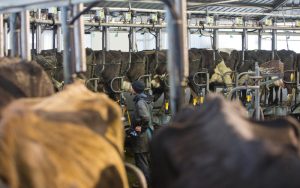
Riddet Institute postdoctoral fellow Debashree Roy came second equal and research officer Nick Smith was third in the International Dairy Federation Professor Pavel Jelen Early Career Scientist Prize.
Winners were announced this week and will receive their prizes at the upcoming International Dairy Federation World Dairy Summit in India in September.
Roy was second equal for her entry titled: “Composition, structure, and dynamic digestion behaviour of milk from different species.”
Her entry focused on her research about how milk composition and structure impact the release of nutrients at various stages of gastric digestion of different mammalian milks, such as cow, goat, and sheep milks.
“Milk is a uniquely designed nutritious food by nature and there is still so much to discover and learn from it,” she said.
She said her research answered important scientific questions about the digestion mechanisms of milk from different mammalian species during coagulation in the stomach, and how that influences the rates of delivery of proteins and fats during digestion in the body.
Nutritional information discovered about the different milks can also help consumers find products tailored to their needs.
“The results obtained have important consequences for developing bio-inspired dairy products with improved digestion characteristics, for controlling the release of nutrients, and to meet the special dietary needs of consumers of all age groups.”
Smith works on the sustainable nutrition initiative.
His third-place entry, “Understanding dairy’s contribution to a sustainable food system”, used a data science and modelling approach to unpick the quantity of food nutrients that come from dairy in our food system.
Smith has been involved in the development of the Delta Model, a global food system that calculates the nutrition available globally from the food system today and under potential scenarios.
“The Delta Model can be used to identify the contribution of individual foods and food groups to nutrient availability.
“This can then be contextualised against the nutrient requirements of the global population, to establish the role of milk production in a sustainable food system from a nutrition perspective.”
Smith said the contribution dairy made to calcium intakes was significant, with dairy supplying 49% of global food calcium while also making large contributions to vitamins B2 and B12, and indispensable amino acids.
“The nutrients provided by milk are currently of major importance to global nutrition. Any change to this status – either increasing or decreasing this contribution – must take the full nutritional consequences of this change into account, alongside the other considerations of sustainability.”
The International Dairy Foundation is the leading source of scientific and technical expertise for all stakeholders of the dairy chain.























